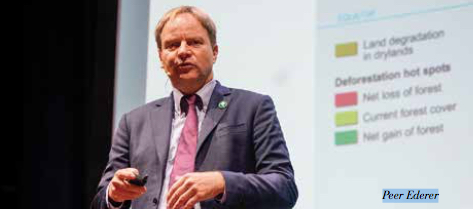The world’s social engineers and animal rights activists are trying to do to the meat industry what they’ve already done to the tobacco industry, according to Peer Ederer, director of the Global Food & Agribusiness Network.
Obviously, smoking is dangerous, but why reduce the consumption of meat?
“Well, they say meat eaters are cruel and irresponsible because they take food away from the hungry, they destroy the planet with greenhouse gas emissions, and meat is unhealthy,” he said.
The result is an increasing legislative burden on the meat industry, voluntary bans against meat, and a very vocal consumer group movement that says people who eat meat should have a bad conscience about doing so.
“Most of these claims are simply not true,” he said, arguing that the world instead needs to produce more meat more efficiently and make it available more cheaply.
Almost 30% of all children under the age of five suffer from malnutrition due to inadequate amounts of animal protein.
“If you experience stunting below the age of five, you are left with a lifelong scar on your physical and mental capacity for the rest of your life,” he said.
Producing more food can be done by using up more land and resources, or by doing the job of agriculture more efficiently.
There are three basic scenarios for feeding the soaring global population, estimated to reach 10 billion by 2050.
The first, which is history continuing, involves expanding arable acres at the cost of wilderness areas. Since 1960, agricultural land has increased by 10%, mainly through deforestation. To reach the goal of feeding the world by 2050, that figure would need to reach 28%.
“We will have to triple the pace of destruction in the last remaining areas of biodiversity,” he said, noting that these areas are in the Amazon, central Africa, and the jungles of Indonesia –areas where the pace of deforestation is already alarming.
The second involved a range of measures such as reducing the consumption of resource-intensive food sources such as meat while increasing the amount of grains, vegetables and fruits in the diet.
Taking meat off the world’s dinner plates, in what he called the “deliberate poverty” scenario, still wouldn’t work.
Even if the Americas and Europe were somehow convinced to adopt voluntary poverty, and meat production was slashed in those areas, the excess production of non-meat food products from both continents is not needed there.
Half the extra food could theoretically be made available for Africans and South Asians, but those areas are economically underdeveloped and lack the capacity to pay for it.
“It’s financially, macro-economically impossible, and socially doubtful,” he said.
Simply closing the “yield gap” between crop production in Africa and South Asia and advanced countries would be enough, but political obstacles to existing and new technologies continue to handicap such efforts.
Increasing livestock production, particularly ruminants, need not compromise efforts to halt climate change.
That’s because the impact of grazing animals on the landscape can be managed so that they increase the richness of the soil and biodiversity, which naturally offsets carbon and methane emissions.
Satellite imagery shows that high livestock production areas and methane emissions do not correlate, and instead point the finger at rice paddies, jungles and leaky Russian gas pipelines, he added.
Technologies such as genetics, genomics and alterations of foods, if deployed, could feed the world’s growing population without destroying the planet.
“We must deploy these technologies, but we must also maintain the trust of the final consumer, otherwise they won’t eat the food that we put in front of them,” he said.
The key to that, he added, is the creation of “ethical capital” in companies.
Ethics means different things to different people. For example, the Bible declares that the Earth and all nature was created for the enjoyment of humans, while on the other hand Aristotle argued that nature has its own intrinsic purpose and value.
Animal rights groups have launched very effective and lucrative campaigns advocating radical views on the ethical treatment of animals that are aimed solely at making meat eaters feel bad.
Also, pets have replaced children in many families, and Barbara Streisand gained notoriety for cloning her dead dog.
The “humanization of nature” is becoming more and more popular, and ethical views are often based on how appealing certain creatures are to human sensibilities.
For this reason, fish and meal worms, for example, are deemed more acceptable as food sources, which indicates that ethical judgments are not as straightforward as they were in the past.
Mr Ederer advised companies to choose an ethical position and maintain it by being transparent and accountable to gain the trust of those consumers who find it compatible with their own views.
In the coming decades, “ethical legitimacy” could be as significant of a driver of value creation for brands than even excellent operations, he added.

